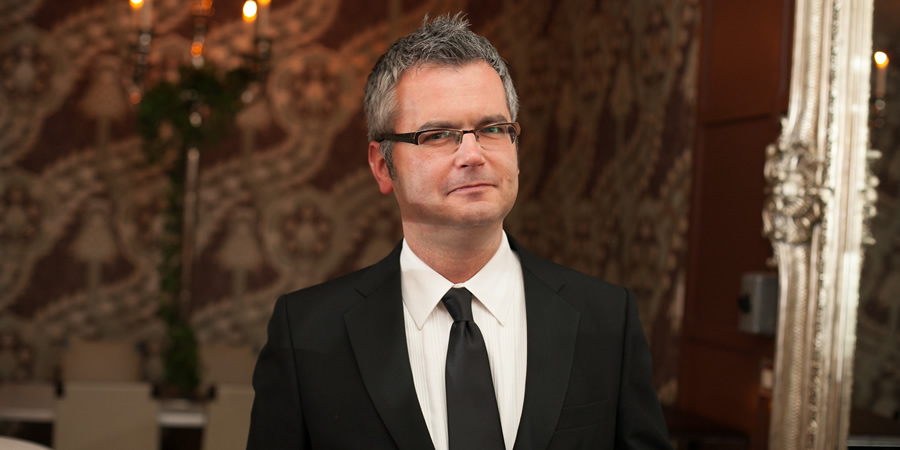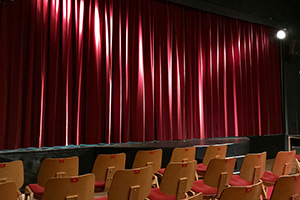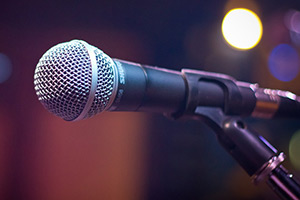It's all a matter of interpretation

I've noticed a few features recently about British Sign Language interpretation for comedy shows, largely at Edinburgh. This is a fantastic thing and anything that helps make live comedy more accessible has to be a good thing, right? As far as I understand it The Laughing Horse Free Festival received a slice of the Fringe 2022 Resilience Fund to enable them to employ BSL interpreters for several performances in August to help improve access to D/deaf audiences. To date the list of shows totals 9 performances across 5 dates - with the promise that more will be added here.
The introduction of the Edinburgh Deaf Festival, which runs from 12-19th August, is a really interesting development and hopefully people can work together to improve access in Edinburgh, and at other comedy festivals and shows in general around the UK.
When we set up Leicester Comedy Festival in 1994 we wanted the event to be as open and accessible as possible. We worked on a number of initiatives to help us achieve our aim. One of these was employing BSL interpreters to work on a number of shows and performances. I think we first interpreted festival shows in the mid 1990s. Here are some of the things we learnt that might help others, including The Laughing Horse Free Festival.
Don't sign everything
BSL is a different language to spoken English. Not everything that is said in a show which is written and performed in English will translate well, so think about the type of shows that are being interpreted. A lot of English live comedy relies on word play, understanding language and other factors that might not translate. Some jokes/comedy only work if you live in a hearing world. It's probably really obvious but visual comedy can work really well for D/deaf audiences, often without a need to pay an interpreter, so maybe these can also be promoted. Also, remember that not all D/deaf people use BSL so it's not OK to have a BSL interpreter and say shows are "universally D/deaf friendly".
Promote the fact you have interpreters to the right people
We made the mistake early on to book interpreters but not actually adequately promote the fact that we were doing this to the right people/communities. So, what happened was loads of hearing people saw interpreters on stage signing comedy shows (something that was a bit unusual at the time) but sometimes hardly any D/deaf people watched and enjoyed the shows. I've had loads of debates over the years of whether, in of itself, this is a positive thing to help raise the profile of interpreters and D/deaf audiences, but I guess what we all really want is more D/deaf people to have the opportunity of being able to enjoy live comedy.
Try and ensure the venue is as D/deaf friendly as possible
Think about what will happen when D/deaf people arrive at the venue. Will there be good signage (in clear, plain English - and using symbols wherever possible) for people to read and follow? What happens if a D/deaf person approaches a member of the team/venue staff before they get to the room? Maybe think about promoting a mobile number people can text if they have any queries, and make sure it's monitored and audience members get an answer as soon as possible. This won't be universally accessible for D/deaf people but some might find it useful. Think about training for staff - could you all learn to sign "hello" for example?
Reserve areas for D/deaf people to sit
D/deaf people in the room need to be able to see the interpreter. I know this is really obvious but (maybe especially at Edinburgh) this should be considered. Sometimes the audience may need to lip read the interpreter a bit so having them all close together is a good idea. If people who need to access the interpreter are sat/stood at the back of a badly lit room, in a packed Edinburgh venue, and can't see the person stood on stage, everyone will be disappointed.
Encourage debate/discussion
Engage with people. The interpreters will (hopefully) be really experienced at what they are doing and will be able to give feedback as to how things went. Listen to positive and constructive feedback. Also engage and listen to audience members, and those that don't become audience members. There will be a whole host of reasons why people enjoy shows and performances that are BSL interpreted, and there will be a host of reasons why they don't. Some of these things will be in your control - and others won't be - but hopefully you will learn (like we did) a massive amount about the D/deaf community and how things can continue to improve.
I've spent pretty much 30 years trying as much as possible to make Leicester Comedy Festival as accessible as it can be. We've not always got things right, and on occasions, we have really failed. However, access in its widest sense is really important so if you do have any thoughts or comments or ideas, feel free to get in touch. If I can help given our experience here in Leicester, I will. I'd be especially keen to hear of anyone that might remember The Deaf Comedians who we booked as part of Leicester Comedy Festival 1996 but seem to have disappeared without trace?
This article is provided for free as part of BCG Pro.
Subscribe now for exclusive features, insight, learning materials, opportunities and other tools for the British comedy industry.




